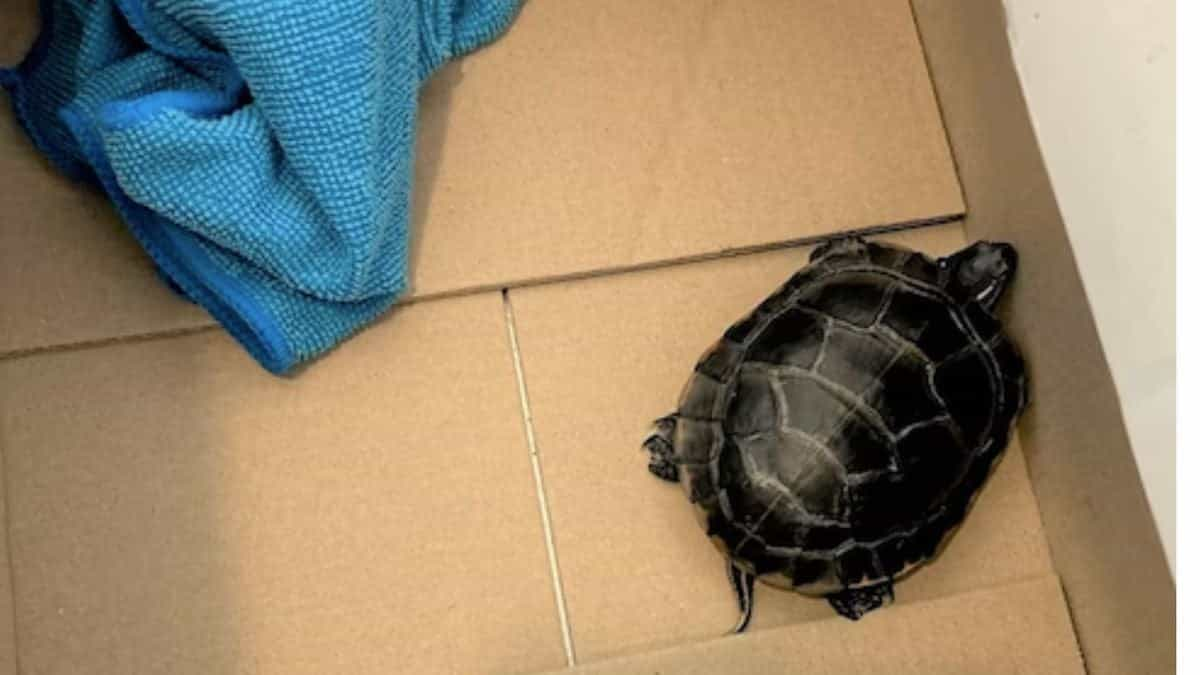Show table of content Hide table of content
A bizarre incident unfolded at Newark Liberty International Airport on March 7, 2025, when security personnel discovered a man attempting to smuggle a live turtle in his pants. This unusual case has highlighted the creative lengths some travelers go to when transporting exotic animals through airport security.
Unusual discovery at airport security checkpoint
Airport security checkpoints routinely detect prohibited items, from oversized liquids to forgotten pocket knives. However, TSA agents at Newark Liberty International Airport experienced something entirely unexpected during a routine screening procedure. As a male passenger walked through the body scanner, alarms triggered specifically around his groin area, prompting immediate attention from security personnel.
When agents conducted a pat-down, they detected an unusual bulge between the man’s legs. Rather than continuing the physical search, the agent requested the passenger to remove whatever was causing the anomaly. To everyone’s astonishment, the traveler reached into his pants and produced a live turtle wrapped in a small blue towel.
Thomas Carter, Federal Security Director for the Transportation Security Administration (TSA), remarked on the unprecedented nature of this discovery: “We’ve encountered passengers trying to conceal knives and other weapons on their person. However, finding someone hiding a live animal in their pants is truly a first for our security team.”
Such unusual discoveries aren’t limited to airports. In a similar case of unexpected animal encounters, a woman who tried to help what appeared to be a stuck turtle received quite a shock when she lifted it up, discovering something completely different than she anticipated.
Red-eared slider smuggling attempt foiled
The twelve-centimeter reptile was identified as a red-eared slider turtle, also known as a Florida turtle (Trachemys scripta elegans). This species is particularly popular as a pet throughout the United States due to its relatively small size and distinctive red markings around the ears.
When questioned by authorities, the passenger acknowledged the species but failed to provide any explanation for his unusual transportation method. The turtle, fortunately, appeared unharmed despite its uncomfortable journey inside the man’s undergarments. Officials immediately confiscated the animal, and police escorted the passenger out of the screening area.
News This TikToker buys a used van and realizes it has a hidden surveillance device.
Animal smuggling attempts at airports have become increasingly common, though most involve more traditional methods like hidden compartments in luggage or special containers. The wildlife trade represents a significant global issue, with many protected species being trafficked across international borders.
Animals often face great dangers during these smuggling attempts. While this turtle was fortunate to be discovered unharmed, many trafficked creatures suffer greatly. These stories of animal rescue remind us of the importance of compassion, like the case where a crow showed remarkable gratitude to a man who rescued it, demonstrating the powerful bonds that can form between humans and animals.
Security consequences for animal transportation violations
The consequences for the turtle-smuggling passenger were immediate and significant. Beyond having the reptile confiscated, he was denied boarding and missed his scheduled flight. This case represents just one example of how attempts to circumvent proper animal transportation protocols can result in travel disruptions and potential legal issues.
The TSA maintains strict regulations regarding animals in airports and on flights. Pets must be properly contained in approved carriers and, in many cases, require specific documentation or permits. When traveling internationally, additional customs regulations apply, particularly for exotic species that may be regulated under conservation laws.
Improper animal transportation can have significant environmental implications as well. Non-native species introduced to new environments can become invasive, threatening local ecosystems. Red-eared sliders specifically have become problematic in many regions worldwide after being released by pet owners.
These concerns echo those surrounding other unusual animal encounters, such as when a fisherman caught a nightmarish fish that appeared to be something out of a monster movie, raising questions about protecting both animals and ecosystems.
Pattern of unusual wildlife encounters at transportation hubs
This turtle incident joins a growing list of bizarre wildlife smuggling attempts documented at airports worldwide. Customs and security personnel have discovered everything from birds taped to passengers’ bodies to reptiles hidden in checked luggage. In some particularly extreme cases, travelers have been caught with endangered species concealed in specially designed clothing or personal items.
While some cases involve criminal wildlife trafficking networks, others result from travelers’ misunderstanding of regulations or attempts to avoid pet transportation fees. Either way, these incidents highlight the challenges faced by security personnel who must remain vigilant for increasingly creative smuggling methods.
News Bat wings after 50? Here’s the most effective exercise, according to a coach.
The relationship between humans and wildlife continues to evolve in surprising ways. From emotional reunions like when a cat missing for 15 years reunited with its owner to scientific mysteries like when scientists were puzzled by a gigantic great white shark captured off the U.S. coast – our interactions with animals continue to fascinate and sometimes perplex us.
For travelers considering transporting pets or exotic animals, the message from airport authorities remains clear: follow proper procedures for animal transportation, obtain necessary permits, and never attempt to conceal living creatures on your person. The consequences – missed flights, legal troubles, and potential harm to the animals – far outweigh any perceived convenience of bypassing regulations.


